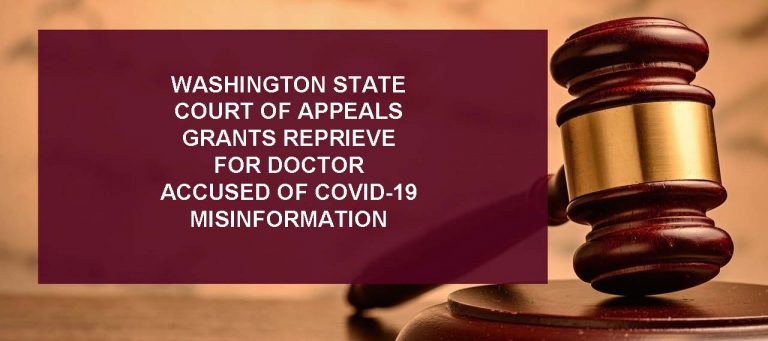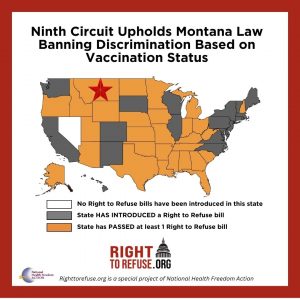

On May 23, 2023 the Court of Appeals for the state of Washington issued a last-minute ruling in favor of Dr. Richard Eggleston, halting an administrative fact-finding hearing set to take place from May 24-26 with the Washington Medical Commission. The doctor’s offense? Publishing opinion columns with dissenting views on COVID-19.
SARS-CoV-2 Misinformation Alleged
The Washington Medical Commission, an administrative agency of the state, filed charges against the doctor on August 9, 2022. The Commission is seeking sanctions against Eggleston relating to moral turpitude, misrepresentation, and interference with an investigation, based mainly on publishing “misinformation regarding the SARS-CoV-2 virus and treatments for the virus” in several newspaper columns for the Lewiston Tribune.
First Amendment Protection
Eggleston denied the claims against him and, “moved to dismiss the disciplinary proceedings on the ground that the opinions contained in his newspaper columns are entitled to First Amendment protection and, violation of his federal and state constitutional rights to free speech.” In order to protect his rights, Eggleston looked outside of the administrative agency proceedings and requested a preliminary injunction from a state civil trial court. That motion was denied but is now pending on appeal. Also, the doctor asked the civil trial court to halt the administrative fact-finding hearing while the appeal is taking place, and in this case he prevailed in halting the fact-finding hearing.
Medical Board Bias
State medical boards generally don’t reveal the source of a complaint, so any malicious actor can make one. And most boards have enormous discretion in pursuing administrative actions, leaving room for politically-motivated decisions. In Dr. Eggleston’s case, he will now have a chance for a regular civil court instead of an agency administrative court to weigh in on the constitutionality of the proceedings that were to begin on May 24.
“Even Balance” Required
Court of Appeals Commissioner Hailey L. Landrus noted that she had the “authority to issue orders…to insure effective and equitable review, including authority to grant injunctive or other relief to a party.” And she offered that in deciding whether to stay one case (the administrative hearing) pending the disposition of another case (the appeal) she must “weigh competing interests and maintain an even balance.”
Inconvenience to the State
The Washington Medical Commission argued that its interests in protecting the public health and disciplining doctors should allow the May 24 administrative hearing to go forward. And Landrus noted that granting the stay “would inconvenience the State’s witnesses and members of the Commission, who have planned to take time away from their regular schedules to attend this three-day hearing.”
No Harm to Public Shown
But Landrus also pointed out that the Medical Commission had not shown that putting off the hearing “would cause actual harm to the public.” Landrus also cited case law holding that, “‘[P]ublic dialogue’ by a professional . . . receives the greatest First Amendment protection.” Further, the Appellate court noted that the Medical Commission’s administrative proceedings might have a chilling effect on other medical professionals.
Appeal May Dispose of Administrative Hearing
Balancing the parties’ competing interests, Commissioner Landrus decided in favor of Dr. Eggleston: “Judicial economy and unnecessary delay and expense also weigh in Dr. Eggleston’s favor. His claim for injunctive relief could be dispositive of the administrative proceedings.”
Free Speech Going Forward
Back in January 2023, a California law purporting to limit the free speech of doctors in the name of fighting misinformation was overturned in the US District Court. Combined with this new case, we can see courts stepping up to do their job and ensure folks’ constitutional rights are protected. In this ongoing COVID-19 era, such protection will surely be needed again. And while this case did not address the substance or truth of Dr. Eggleston’s essays, judges in the future may well have to face that underlying issue also.




